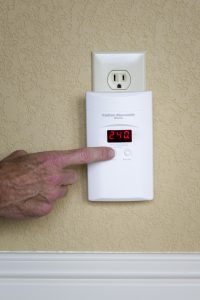Carbon monoxide poisoning is no laughing matter. It can cause serious health problems and even kill you and your loved ones. Even worse, you can’t tell it’s a problem because it is silent and carries no smell. How do you defend against this invisible killer? With a carbon monoxide detector. But our clients often have questions about these simple devices that resemble smoke detectors, so here are some of the basics.
Carbon Monoxide Detectors: Frequently Asked Questions
- Do I need a carbon monoxide detector? Carbon monoxide is a byproduct of combustion, so if your home has a gas water heater, HVAC, stovetop or oven, dryer, fireplace, woodstove or other appliance that burns fuel, you’ll need to have a carbon monoxide detector for safety.
- What else can cause carbon monoxide in my home? Other sources can include anything with an internal combustion engine that you run in your home or garage, such as a grill, vehicle, lawnmower or lawn tools.
- What are the different types? There are two types, battery-operated and hard-wired, much like smoke detectors. Battery-operated units must be tested regularly and have the battery replaced once a year. Many people find it convenient to change the battery when they change their clocks in the fall, at the same time as the smoke detector battery is replaced.
- How many should I have? It’s recommended that you have one detector on every floor of your home, with a minimum of one on each sleeping floor and one on each floor that has a combustion appliance.
- What makes my alarm go off? The alarm can go off if your home is sealed up too tightly and carbon monoxide builds up, if a gas-powered tool is used in the garage, if a grill is used inside the home, if there is a malfunction in the home’s combustion appliances or if there is a malfunction in the alarm itself.
- What do I need to do when the alarm goes off? If anyone is having any flu-like symptoms, such as dizziness, nausea, headache or problem focusing, get out! Immediately leave the home, taking all persons and pets with you. Call 911 to get medical help. If nobody is feeling badly, call your AC repair service to determine where the problem is.
A carbon monoxide detector is an inexpensive piece of equipment that can literally be the difference between life and death. If you need help finding the right one or making sure it is installed properly, please feel free to contact us today. Cox Heating & Air Conditioning has been serving Florida homeowners since 1958 with quality service and top technical knowledge.





Leave a Reply